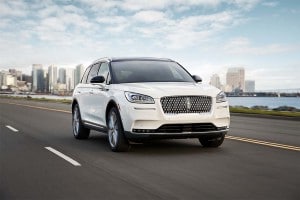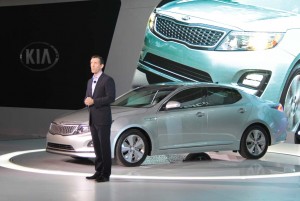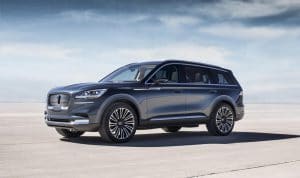It was something of a homecoming when Michael Sprague was named director of global brand and integrated marketing at Ford Motor Co. last October. He spent much of his early career under the Blue Oval before signing on at Kia Motor America.
After a decade with the Korean brand, rising to become its U.S. chief operating officer, Sprague unexpectedly headed back to Michigan and, in the spring of 2019 was moved over to Lincoln as its new director of sales, service and marketing for North America.
It’s not going to be an easy job considering the challenges Lincoln has faced over the past several decades. Once a dominant player in the American luxury market, it now lags behind key imports like Audi, BMW, Lexus and Mercedes-Benz, as well as cross-town rival Cadillac.
(The People Have Spoken: Lincoln, Ram and Nissan Take Top Honors)
But Lincoln is showing some notable momentum with its ongoing push into the SUV market. Year-over-year sales rose 11.2% for the second quarter, despite slumping demand for its passenger car models, the MKZ and Continental.
A major test will come with the launch of the all-new Lincoln Aviator, a three-row crossover targeting young families who need lots of space, as well as the Corsair, the complete makeover of the old MKC. TheDetroitBureau.com caught up with Sprague during the first media drive of the Aviator and discussed Lincoln’s challenges, promises and plans.
TheDetroitBureau: Lincoln has faced decades of decline. What do you see going forward?
Sprague: There are a lot of challenges we face as a brand. One of the biggest is changing the perceptions of people who remember the Lincoln of old. But there are the Millennials and Gen-Xers who have no real perception of us, which is a real advantage for us.”
TheDetroitBureau: The Aviator is the first all-new vehicle Lincoln has had in a while and it is being seen as a critical new entry for you.
Sprague: The brand is positioned to take off. The company has invested in
product and Aviator is the first where you really see the promise of Quiet Flight (the brand’s marketing and product development strategy) really come through.
TheDetroitBureau: The Aviator is the latest model to move away from the controversial MK naming strategy which seemed to confuse customers, more than anything.
Sprague: It’s nice to lean into the (company’s) heritage because there were some great names in the past.
(Lincoln Corsair: A Small SUV with a Big Role to Play)
TheDetroitBureau: Are those MK names gone for good or will you keep them on some products?
Sprague: Potentially we may keep the MKT name because that model primarily serves fleet buyers.
TheDetroitBureau: The Ford brand is eliminating all passenger car models but for the Mustang. What about Lincoln? Will the MKZ and Continental stick around?
Sprague: Sedans still represent 30% of the U.S. market, so they are very important for us. In China, which is very important for the Lincoln brand, sedans represent even more of the market, 50%, and remain particularly popular with luxury buyers. As long as (the U.S. and China operations at Lincoln) are working together, sedans will represent an important part of the line-up for us.
TheDetroitBureau: Would you add still more sedans? And what about more SUVs?
Sprague: I can’t talk about future product, but we are looking at opportunities for new products.
TheDetroitBureau: Would you ever expand the SUV line-up to look like what we see with German brands like BMW and Mercedes-Benz?
Sprague: No. You have to keep in mind our dealer network. Loading them up with 10 different vehicles would be a challenge for them. If you stick with the core products – with Aviator we now represent 90% of the market – that’s where we come in.
TheDetroitBureau: Lincoln has had a regular hybrid in its line-up but the Grand Touring version of the Aviator is its first plug-in model
Sprague: The Grand Touring should have strong appeal, especially along the coasts, but we’re seeing initial, strong demand elsewhere. So much of the market is moving towards the electrification space.
TheDetroitBureau: That’s particularly true in the luxury market where battery power is being focused on performance, not just improved fuel economy.
Sprague: Tesla created that whole business case and there is clearly demand there.

The compact Corsair will be offered initially with two turbo engine options, but a PHEV will follow, and an all-electric version is also in development.
TheDetroitBureau: What about all-electric models? We know Cadillac has some coming.
Sprague: We are at the tipping point for the industry when it comes to electrification. The only question is how fast? We’ll be watching the reaction to the (Aviator) Grand Touring to decide whether we accelerate our electrification plans or slow down.
TheDetroitBureau: Getting back to the old MKT model, many competitors are moving away from fleets but you seem ready to stick with that segment of the market. Why?
Sprague: There is a place for some very limited, targeted, high-end fleet. A lot of people aren’t going to take the chance to (buy a Lincoln) but this gives us a way to reach people who otherwise wouldn’t. Our big challenge is to simply get people into our cars.
TheDetroitBureau: So, can you challenge today’s luxury leaders and regain your former glory?
Sprague: This is a journey, not one or two years but a five- to 10-year process.
(New Lincoln Continental Gets Some Coach-ing for 2019)




Congrats Michael
You’ll meet the challenge.